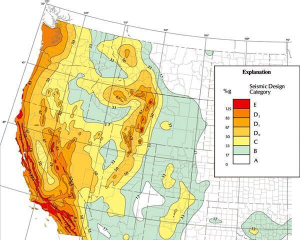Idaho is the fifth-most earthquake-prone state after California, Alaska, Nevada, and Utah. Though Idaho earthquakes do not typically exceed a magnitude 3, we have experienced many significant earthquake events in the past and should plan to again in the future. Community members, tenants and homeowners stand the best chance of surviving an earthquake when precautionary steps are taken ahead of time.
Preparing for an Earthquake
- Stock up on emergency supplies that can be used after an earthquake. These supplies should include a first aid kit, emergency supply kits, medications, diapers, hygiene products, extra water, and food. Store at least a three-day supply for you, your family, and any pets/service animals.
- You should also make a list of important information (like telephone numbers of emergency contacts, insurance information, and important medical information) and gather any important documents (like medical documents, birth certificates, and passports). Store these items in a secure location like a fireproof or waterproof safe so that you know exactly where they are if you should need them. Make sure you have emergency cash saved in the safe as well.
- Do not hang heavy mirrors or pictures above beds, chairs, and other places where you sit or sleep. Find other places for heavy wall art and anchor these items with wire through eye screws bolted into wall studs. Or place screws on both sides, top, and bottom of the frame and screw these into the studs.
- Check your chimney or roof for loose tiles and bricks that could fall on you or your neighbors during an earthquake. Ask your landlord to repair loose tiles or bricks, as needed.
Surviving an Earthquake:
If you are in your home when an earthquake starts, drop to the ground and crawl beneath a desk or other table and cover your head and neck. If you have a pet/service animal with you, and they can be handled, drop to the ground with your animal. Hold on to the leg of the desk or table if you can. If your animal struggles to get away or becomes aggressive, let them run away and find safety on their own. Your safety should always come first, and animals often prefer to find their own safe spot. Do not flee out of your home and into the street during an earthquake. This can make you vulnerable to falling debris from buildings, trees, power lines, etc.
Earthquake Safety for People with Disabilities
People with mobility problems:
- If you are in a recliner or bed: Lie on your stomach and cover your head and neck with your arms or a pillow until the shaking stops.
- If you use a cane: Drop, Cover, and Hold On or sit on a chair or in a bed and cover your head and neck with both hands. Keep your cane nearby.
- If you use a wheelchair or walker: Lock your wheels. If using a walker, carefully get as low as possible.
People who are deaf or hard of hearing:
- Prior to an earthquake, identify and test multiple ways to receive warnings and evacuation information.
People who are blind or have low vision:
- Earthquakes can cause items to fall and furniture to shift. Regular sensory clues may not be available. Move with caution.
People with developmental/cognitive/intellectual disabilities:
- If you have difficulty understanding, remembering, or learning, keep a simple list of what to do and important information with you and in your kits. Practice your plan.
- If you use an alphabet board, speech-generating device, or mobile device with an app to speak or communicate, include these in your planning.
Recovering from an Earthquake
- If your home is no longer structurally sound, leave immediately! Do not stay inside to search for pets/service animals or valuables. Call 911 for help.
- Check yourself and others (including animals) for signs of injury. Call 911 if needed.
- Put out small fires in your home or neighborhood. Call 911 if needed.
- Prepare for aftershocks – these can last for days or weeks.
- Put on shoes before investigating your home in case of broken glass or debris.
- Shut off the main gas valve if you suspect a leak because of broken pipes or odor. Do not light your stove or use gas furnaces until you are sure there has been no leak.
- Stay away from downed power lines or any objects that are in contact with them.
- Shut off power at the control box if there is any danger to house wiring.
- Throw out food from open containers that are near shattered glass.
- Clean up any spilled medicines, drugs, or other harmful materials such as bleach.
- Beware that items may tumble off shelves when you open doors of closets and cupboards.
- Make sure that there are no immediate hazards in your own home before leaving to check on friends or neighbors!